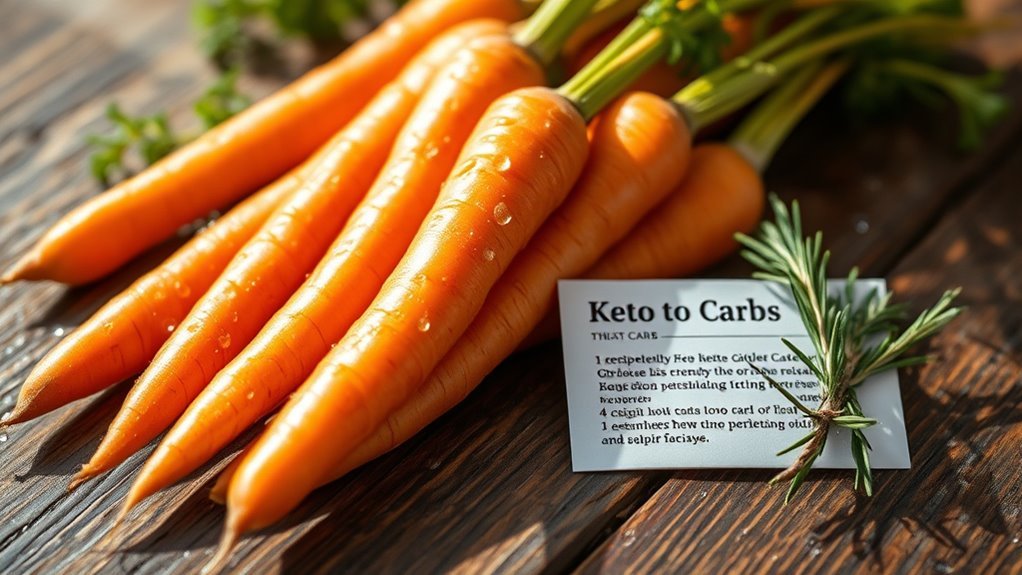Yes, you can eat carrots on a ketogenic diet, but you need to be mindful of their carbohydrate content. Carrots have about 9 grams of carbs per 100 grams, which can add up quickly. They offer health benefits like antioxidants and fiber, but moderation is key. You might want to limit your serving size to around half a cup to stay within your carb limits. If you want to explore how to include them wisely, there’s more to discover.
Understanding the Ketogenic Diet

When you’re exploring the ketogenic diet, it’s essential to understand its core principles. The keto principles emphasize a high-fat, moderate-protein, and low-carbohydrate approach, designed to shift your body into a state of ketosis. In ketosis, your body becomes efficient at burning fat for fuel instead of carbohydrates. This process is known as fat adaptation, where your metabolism adjusts to utilize fat as the primary energy source. By drastically reducing your carb intake, you encourage your body to enter ketosis more quickly. It’s important to note that while fat adaptation can offer numerous benefits, it may take time for your body to adjust. Understanding these principles can empower you to make informed choices and enjoy the freedom of a ketogenic lifestyle.
Nutritional Profile of Carrots

Carrots, often celebrated for their vibrant orange hue and crunchy texture, have a unique nutritional profile that’s worth examining, especially for those on a ketogenic diet. While orange carrots are the most common, there are various carrot varieties, such as purple, white, and yellow, each offering distinct flavors and colors. These different types also exhibit nutritional differences; for instance, purple carrots contain anthocyanins, which have antioxidant properties. Carrots are a good source of vitamins A, C, and K, along with fiber and minerals. However, their carbohydrate content can vary slightly between varieties, impacting their suitability for a keto lifestyle. Understanding these factors can empower you to make informed choices about including carrots in your diet while respecting your nutritional goals.
Carbohydrate Content in Carrots

While many people appreciate carrots for their health benefits, the carbohydrate content is an essential factor to take into account if you’re following a ketogenic diet. Carrots generally contain about 9 grams of carbohydrates per 100 grams, which can add up quickly. Different carrot varieties, like baby carrots or purple carrots, may have slightly varying carb counts, but they’re generally not classified as keto-friendly options. If you’re keen on staying within your carb limits, consider alternatives such as radishes or zucchini, which are lower in carbs. Ultimately, if you choose to include carrots, moderation is key. Being aware of their carbohydrate content allows you to enjoy a balanced diet while maintaining your keto lifestyle.
Comparison of Carrots With Other Vegetables
In the domain of vegetables, comparing carrots to other options can help you make informed choices while on a keto diet. While carrots are nutritious, their carb content can be higher than some other vegetables. Here are three key vegetable comparisons to examine for carrot alternatives:
- Zucchini: Lower in carbs, zucchini can be spiralized for pasta alternatives.
- Spinach: Packed with nutrients, spinach is very low in carbs and versatile in dishes.
- Cauliflower: A popular substitute for rice or mashed potatoes, cauliflower is also low in carbs.
These carrot alternatives offer a variety of textures and flavors, allowing you to keep your meals exciting and keto-friendly. Exploring these vegetable comparisons can empower you to craft a balanced diet while enjoying your freedom in food choices.
Health Benefits of Carrots
Carrots are a nutrient-dense vegetable packed with essential vitamins and minerals, making them a great addition to your diet. They’re especially known for their eye health benefits due to high levels of beta-carotene, which your body converts into vitamin A. Plus, their antioxidant properties help combat oxidative stress, promoting overall wellness.
Nutrient-Dense Vegetable
Rich in vitamins and minerals, carrots are a nutrient-dense vegetable that can offer significant health benefits, even for those following a keto diet. Different carrot varieties provide diverse nutrients that enhance your overall well-being and aid nutrient absorption. Here are three key benefits:
- High in Antioxidants: Carrots contain beta-carotene, which converts to vitamin A, essential for immune function.
- Low in Calories: With their natural sweetness, carrots can satisfy cravings without derailing your keto goals.
- Fiber-Rich: The fiber in carrots aids digestion and helps you feel full longer, supporting healthy eating habits.
Including carrots in moderation can complement your keto lifestyle while providing crucial nutrients your body craves. Enjoy the freedom to explore various carrot varieties for added health benefits!
Eye Health Boost
Including carrots in your diet can greatly benefit your eye health, thanks to their high levels of beta-carotene. This powerful antioxidant is converted into vitamin A in your body, which is essential for maintaining good vision. Regular consumption of carrots can help reduce the risk of age-related macular degeneration and improve overall carrot eye health. Additionally, the vision benefits extend beyond just preventing conditions; beta-carotene may enhance night vision and support better visual acuity. If you’re looking to maintain your eyesight as you age, incorporating carrots into your meals can be a smart choice. Just remember, while carrots can be part of a keto diet, moderation is key to keep carb counts in check.
Antioxidant Properties
Packed with antioxidants, carrots offer a range of health benefits that extend beyond just eye health. These vibrant veggies contain various carrot compounds that can support your well-being. Here are some key antioxidant benefits you might enjoy:
- Reduced Inflammation: Carrot compounds help combat oxidative stress, lowering inflammation in the body.
- Enhanced Immune Function: Antioxidants in carrots can boost your immune response, helping fend off illnesses.
- Heart Health Support: Regular consumption of carrots may contribute to better heart health by improving cholesterol levels and blood pressure.
How to Incorporate Carrots Into a Keto Diet
Although many people consider carrots too high in carbs for a strict keto diet, there are ways to enjoy them in moderation. You can incorporate carrots into your meals by using them in keto salads or creating delicious carrot recipes that balance out their carb content. For instance, try shredding carrots and mixing them with leafy greens, avocado, and a low-carb dressing for a revitalizing salad. Alternatively, you can roast or sauté carrots with olive oil and herbs to enhance their natural sweetness while keeping portions in check. Remember, it’s all about moderation; enjoy the vibrant color and nutrients of carrots without overdoing it. This way, you can savor their flavor while staying aligned with your keto goals.
Portion Control and Serving Suggestions
When it comes to enjoying carrots on a keto diet, portion control is key. A recommended serving size is about half a cup, which helps keep your carb intake in check. To enhance your snacks, consider pairing carrots with healthy fats like hummus or guacamole for a satisfying and balanced treat.
Recommended Serving Size
While carrots can be a nutritious addition to your diet, it’s important to monitor portion sizes on a keto diet due to their carbohydrate content. To maintain a balanced daily intake, consider these recommended serving sizes:
- Raw carrot sticks: Aim for about ½ cup (roughly 30 calories, 7 grams of carbs).
- Shredded carrots: Limit to ¼ cup (approximately 12 calories, 3 grams of carbs).
- Cooked carrots: Enjoy up to ½ cup (around 27 calories, 6 grams of carbs).
Pairing With Fats
To enhance your keto meal plan, pairing carrots with healthy fats can be a strategic way to boost flavor and nutritional value while keeping your carb intake in check. Consider incorporating carrot dips that feature fat pairings like avocado or olive oil. These combinations not only enhance taste but also increase satiety.
Here are some great options for pairing:
| Carrot Dip | Fat Pairing |
|---|---|
| Hummus | Tahini |
| Creamy Avocado Dip | Olive Oil |
| Tzatziki | Greek Yogurt |
| Ranch Dressing | Sour Cream |
| Peanut Butter Dip | Coconut Oil |
Using these delicious combinations lets you enjoy carrots without compromising your keto goals. Just remember to practice portion control to maintain your carb limits!
Snack Ideas and Tips
Snacking on carrots can be a satisfying option for those following a keto diet, but it’s important to keep portion sizes in mind to avoid exceeding your carb limits. Here are some tips for enjoying carrots as a crunchy snack while practicing portion control:
- Prep in Advance: Cut your carrots into veggie sticks for easy meal prep. This helps you grab a healthy snack whenever you’re hungry.
- Pair Wisely: Use keto-friendly dips like guacamole or sour cream. These healthy toppings enhance flavor while keeping your carb count low.
- Mix It Up: Combine carrots with other low carb alternatives, like cucumber or bell pepper, for a colorful, crunchy snack pack.
Alternatives to Carrots on Keto
If you’re looking for alternatives to carrots on a keto diet, you’re not alone; many people seek low-carb vegetables that fit their nutritional goals. Instead of carrots, consider keto-friendly vegetables like zucchini, which can be spiralized for a fun pasta alternative. Cauliflower is another versatile choice; you can rice it or mash it as a substitute for traditional carbs. Broccoli and spinach are also excellent low-carb alternatives packed with nutrients. Bell peppers add crunch and color, while leafy greens like kale provide a variety of vitamins. Incorporating these vegetables not only keeps your meals interesting but also helps you stay within your carb limits, allowing you to enjoy the freedom of a diverse keto-friendly diet.
Final Thoughts on Carrots and Keto
While it’s tempting to include carrots in your meals due to their crunch and sweetness, it’s important to take into account their carbohydrate content in the context of a keto diet. Fortunately, you have some flexibility! Here are a few things to contemplate:
- Carrot Varieties: Different types, like baby or purple carrots, may have varying carb counts.
- Portion Control: A small serving can fit into your daily carb limit, allowing you to enjoy their flavor without derailing your progress.
- Alternatives: Think about lower-carb veggies such as zucchini or bell peppers to maintain that crunch without the carbs.
Ultimately, if you’re mindful of your choices, you can enjoy the best of both worlds on your keto journey.
Frequently Asked Questions about Eating Carrots on Keto
1. Can I eat carrots on a ketogenic diet?
Yes, you can eat carrots on a ketogenic diet, but it’s important to be mindful of the portion size. Carrots are relatively higher in carbohydrates compared to other non-starchy vegetables, so moderation is key. A small serving can fit within your daily carb limit, but larger servings may hinder your ability to maintain ketosis.
2. How many carbs are in carrots?
A medium-sized carrot (about 61 grams) contains approximately 6 grams of carbohydrates, of which about 1.5 grams are fiber. This means that the net carbs are roughly 4.5 grams. Depending on your daily carb allowance on a keto diet, this can be a reasonable amount if consumed in moderation.
3. What are some keto-friendly alternatives to carrots?
If you’re looking for alternatives to carrots that are lower in carbs, consider options like celery, cucumber, bell peppers, and leafy greens such as spinach and kale. These vegetables are excellent for snacking or adding to salads and are more compliant with a strict ketogenic diet.
4. Can eating carrots affect my ketosis?
Eating carrots in moderation is unlikely to affect your ketosis, especially if you are attentive to your overall carbohydrate intake. However, if you consume large amounts of carrots or other higher-carb foods, it could potentially kick you out of ketosis. Always balance your meals with low-carb vegetables to maintain your keto goals.
5. Are there any health benefits to eating carrots on keto?
Absolutely! Carrots are rich in vitamins, particularly vitamin A, which is essential for eye health, and they also provide antioxidants that can help reduce inflammation. Including small amounts of carrots in your keto diet can contribute to your overall nutrient intake while still aligning with your dietary goals.
References
- https://www.healthline.com/nutrition/keto-diet-foods#vegetables
- https://www.ncbi.nlm.nih.gov/pmc/articles/PMC6469477/
- https://www.medicalnewsToday.com/articles/325345
- https://www.washingtonpost.com/food/2020/01/09/keto-diet-everything-you-need-know/
- https://www.nutrition.gov/topics/nutrition-101/nutrition-resources
- https://www.cdc.gov/healthyweight/healthy_eating/vegetables.html
- https://www.jamanetwork.com/journals/jama/fullarticle/2675405
- https://www.health.harvard.edu/staying-healthy/the-keto-diet-what-you-need-to-know


